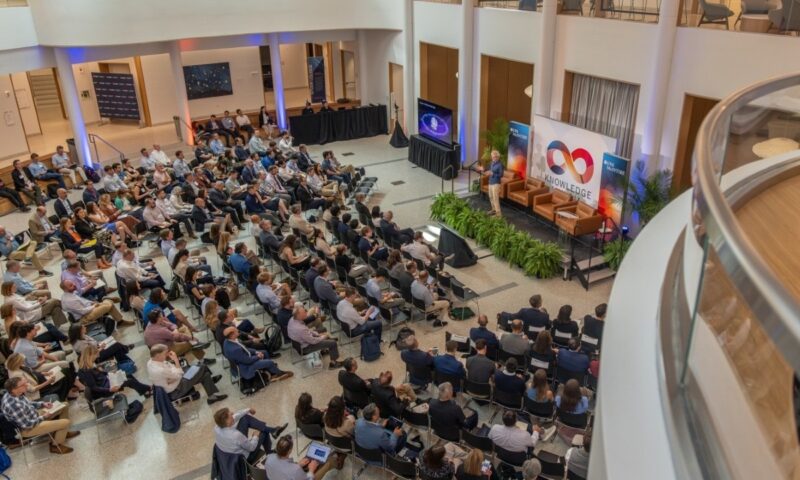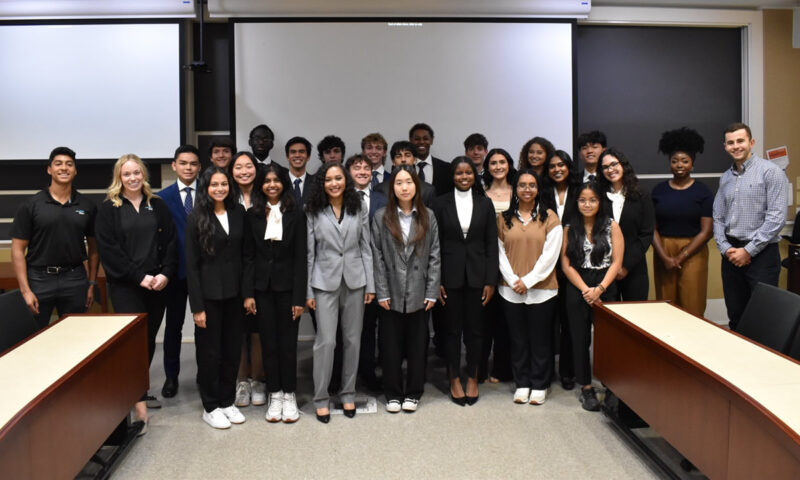Veterans of the U.S. armed forces share a bond of impactful experiences that they take with them after their time serving in the military. It shapes much about how they see life, and for some, it has also informed their approach to their years in the Commerce School.
Professor Jeffrey Lovelace, who serves as adviser to the Student Veterans of America at UVA, is a veteran himself of two Iraq combat tours: Fallujah and the Sadr City area of Baghdad. In 2014, Lovelace left the military as a Major, returning to Penn State (where he earned his M.S. in Industrial/Organizational Psychology) to pursue his Ph.D. in hopes of a career in academia—which ultimately led him to UVA.
That professional pivot was clearly aided by his Army background, which he insists has had implications for both his career and personal life.
“I have been in some of the most stressful environments imaginable, and that has helped me to put things in perspective,” he says noting how the military was directly responsible for reinforcing his values, such as caring for those around him. “Further, seeing the impact that good (and bad) leaders can have on an organization and its members inspired my interest in researching the factors that influence how leaders make sense of the world around them and make decisions that impact people and organizations.”
Those leadership concerns carry over into his advisory role with the student group, which he considers an important responsibility due in no small part to the notion that this particular demographic is “woefully underrepresented,” not only on Grounds, but at major universities across the country as well.
“I want to do whatever I can to support student veteran success at UVA,” Lovelace says. “Veteran students have a wealth of real-world leadership experience, and they add an important perspective to the overall UVA community. I truly believe that veterans who pair their military experience with the education at UVA can accomplish wonderful things that better the world around them.”
While he recalls proud moments hearing of veteran Commerce School graduates earning positions at organizations such as NASA, Bain, and Deloitte or continuing their studies at renowned graduate school programs, he finds the most rewarding aspect of being an adviser is witnessing group members’ commitment to advocate for future veteran students at UVA.
“Veterans, as nontraditional students, face unique challenges pursuing the completion of their degree, and they are much more likely to be successful when a supportive environment is present around them. The selflessness of our student veterans who are working to create this environment at UVA is truly admirable, and I feel lucky to work with them,” says Lovelace.
McIntire has always welcomed veteran applicants seeking to study its innovative business education, and events by faculty veterans such as Professor A.J. Baglioni’s annual picnics have long supported a sense of community at Rouss & Robertson Halls.
In observation of Veterans Day, we spoke with a few of the veterans who are currently shaping the Commerce School with their skills and vision, and asked them about them about their relationship with the national holiday honoring service.
Lasting Benefits
Alex Naupari (McIntire ’21) found himself at U.S. Marine Corps boot camp two short weeks after graduating high school. He chose that path to follow in his Marine brother’s footsteps and also saw the option as a clear first step toward achieving financial independence.
“My military experience has given me the confidence to put myself out there and to try new things during my time at UVA. That confidence has led me to a position as the Latinx Student Network’s President and Transfer Mentor Chair at McIntire. It has caused some unique challenges, too, as my priorities and goals are not the same as those of most of my peers. I found comfort in the company of other veterans who were also experiencing the same challenges,” he says.
Tommy Vento (McIntire ’21) joined the Marine Corps in 2012, shortly after graduating from high school, wanting to give back and aiming to be part of an organization with a reputation for pushing its members beyond their usual limits. After serving as a Light Armored Vehicle Crewman for five years, he transitioned out honorably in 2017 as a Corporal. He says the impact of his military background has had a large and positive impact on his college career.
“The obvious things like punctuality and stress management help of course, but the nature of the group work at the Commerce School allows me to share my unique experiences with my classmates and leverage some of my leadership skills. Post-military education has also come with challenges. When I started school again in 2017, I hadn’t taken a math class in six years, and definitely didn’t remember all my MLA rules; my first semester was hard.”
Personal Meaning
Each of the veterans we spoke with derives different significance from their experiences as veterans, but they all seem to share a mutual profound respect for both those who came before them and those they served with when considering Veterans Day.
Connor Burns (McIntire ’22), who spent four years in the Marine Corps, stationed with the Presidential Helicopter Squadron to provide security for the President’s helicopter, Marine One, says his chosen service branch of the armed forces will always be his family. Pride and gratitude define Veterans Day for him, as he remembers “those who gave their last full measure of devotion to their country.”
He recalls a trip that he took to Belleau Wood, France, in 2018 with reverence: “I had the privilege to pay tribute to the fallen Marines who fought bravely in the Battle of Belleau Wood during World War I. Every Marine needs to see those wheat fields; it was a surreal and humble experience. These Marines were led by people like Gunnery Sergeant Fred Stockham, a man who gave his gas mask to a young Marine in an action of self-sacrifice, which earned him the Medal of Honor.”
A former Army Cavalry Scout who came from a military family across generations, Austin Cox (McIntire ’22) also believes sacrifice is key to understanding the seriousness of Veterans Day.
“It’s a constantly changing world, and it’s really easy to compare someone’s service now to someone’s service 50 years ago; I think that even in different environments, everyone had to sacrifice something, and Veterans Day is really a chance for every veteran to feel proud of what they have done.”
Naupari agrees, while including those who are still part of the armed forces in his thoughts. “Being a veteran means I am a part of a community that has served and sacrificed a part of their life, if not their whole life, for their country. I am proud to call myself a veteran because of the people who have served before me and are currently serving.”
Noah Larmann (McIntire ’21) served four years in the U.S. Air Force as a Financial Management Technician, with a seven-month deployment as Force Protection in Kuwait, before deciding to leave the service as an E-4 (Senior Airman). He says that being part of the veteran community is paramount, recognizing that he and his veteran peers have undertaken similar trials and lived through moments foreign to people outside of the military.
But while he thinks Veterans Day provides “an opportunity to thank everyone who did serve and acknowledge that for some the sacrifice required is significant,” Larmann also believes it’s an appropriate time “to address issues veterans face in society today and how those can be improved.”
Vento says that many of his peers approach the Nov. 11 holiday as if it were created for someone else. “The mindset is something like ‘Somewhere out there, another veteran deserves more recognition than me.’ This ironic lesson in humility demonstrates the quiet sacrifice millions of veterans have made and continue to make. To me, Veterans Day is an opportunity to share a day with others who have made similar sacrifices, and seemingly the one day a year when military service can be truly removed from politics. Veterans Day has always been important to me because it’s one of the only things that unites veterans of all ages.”
Continued Connections
Beyond their time at McIntire, the student veterans plan to stay fully involved with the community in the years to come. Naupari says he expects to continue working with Student Veterans of America at UVA after he graduates to further assist undergraduate veterans with some of the advances the group has made at the University. He also is intending to be a part of the Veterans at Bain group at his future employer, to network with and learn from his colleagues.
Larmann predicts that wherever life takes him, he’ll locate his people, noting that he’s interested in advocating for critical issues such as veterans benefits. “We end up finding each other and connecting very quickly. Like I did when I got to UVA, I will continue to seek out veterans groups and find new friendships there.”
Burns stays actively involved in the Wounded Warrior Project; Cox has remained in touch with the founder of Veterans on Wall Street (VOWS), and down the road, hopes to contribute by donating his time to assist other veterans seeking business positions, as well as easing the process for those transitioning into college after serving.
Explaining that veterans “tend to be prideful and skeptical of outside help,” Vento plans to be a resource for younger veterans. He also mentions that he has been helping advance a related cause that is philosophically close to home.
“In March, some veteran friends and I established a philanthropy-based yard sign company, YardWare Signs LLC, that donates 10% of our profits to a charity related to each product. Our first product we offered was a yellow ribbon sign intended to give back to the veteran community.”
For his part, Lovelace notes that even during such a strange year, our lives can remain incredibly busy, but that Veterans Day creates a much-needed moment to pause and reflect about service to our country and the power of community to reach monumental goals.
“When I think about being a veteran, I am reminded of a deep connection to all those who decide to serve something bigger than themselves,” he says. “Through my experiences in the Army, I got to see firsthand what people from diverse backgrounds can accomplish when they work together.”



